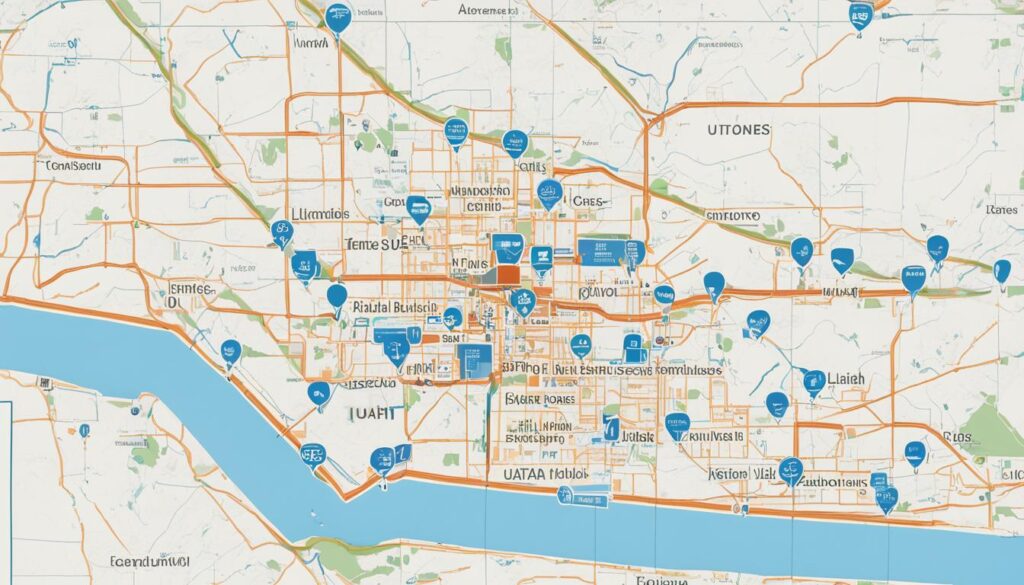Imagine this: You’ve built your business from the ground up, weathering the storms of entrepreneurship, and nurturing your enterprise into a thriving market force. And then, one day, you’re handed a notice that snaps the rhythm of your bustling endeavor—your business license is revoked. Suddenly, what happens when a business license is revoked becomes not just a cautionary hypothesis but a stark reality you’re facing.
The impact of revoking a business license is immediate and unyielding. No longer can you legally conduct business, leading commerce to a grinding halt. If you’re a contractor in states like California or Louisiana, this could mean a revocation period of up to five years coupled with damaging financial penalties. Marijuana dispensaries, with the complex tapestry of state and local regulations ensnaring them, also find themselves in troubled waters, with any infraction potentially leading to the loss of their license, as seen in areas like South Lake Tahoe and with multiple dispensaries in Missouri. It isn’t an issue of ‘if’ your business can survive, but ‘how’ and ‘what’ measures must you take to rebound from such a pivotal moment.
Key Takeaways
- Business operations must cease immediately after a license revocation, signifying the severity of non-compliance.
- Financial penalties and a revocation period can vary widely, hitting some industries like contracting and cannabis particularly hard.
- Mishaps such as neglecting license renewal, document omissions, or legal breaches can be a downfall.
- License revocation is not a simple hurdle—it’s a critical challenge demanding immediate and strategic remedial action.
- Educating yourself on the consequences and preventive measures is pivotal for the sustainability of your business.
Understanding Business License Revocation
Navigating the intricacies of a business license revocation can be daunting. It’s a multi-faceted challenge that requires a deep understanding of the legal landscape to minimize the potential consequences. Whether you are looking to establish a new venture or are already operating an existing business, it’s crucial to remain informed about the reasons and repercussions that come with having your license revoked. As such, let’s delve into the circumstances that might lead to this situation, the role of regulatory bodies, and the particular pressures facing high-risk industries.
Circumstances Leading to Business License Revocation
The revocation of a business license seldom occurs without warning. It’s often the culmination of a series of events or non-compliance issues. Forgetting to renew your license on time, or more serious infractions such as breaching state laws or failing to adhere to industry regulations, can put your business at significant risk. Failure to meet these essential requirements, intentionally or not, can lead to severe business license revocation consequences. It goes beyond penalties; it’s a major roadblock that could end in the permanent closure of your business.
Regulatory Bodies and Their Oversight Responsibilities
Ensuring regulatory compliance is a fundamental element of running a business, and this is where regulatory bodies come into play. They enforce the rules and standards that govern your operations, rigorously monitor your business’s adherence, and provide directives for correction in the case of violations. These entities hold the keys to your business’s future, emphasizing the importance of fulfilling your legal obligations to avoid the repercussions of business license revocation.
Business Industries and High-Risk Compliance Areas
Operating in a high-risk compliance area demands an even greater attention to detail and strict adherence to the law. Specific sectors, such as construction or the cannabis industry, are under constant scrutiny. Even minor deviations from compliance norms in these sectors can trigger significant revoked business license effects. It’s not merely about following rules; it’s about ensuring the survival and ethical integrity of your business. The stress on high-risk business compliance cannot be overstated—it is the bedrock on which safe and legitimate operations are built.
Immediate Effects of Having a Business License Revoked
Confronting revoked license outcomes isn’t just about dealing with a piece of paper—it’s a real-life disruption that can challenge your business’s very essence. Imagine if one day, your business is thriving, the next, you’re facing the stark reality of immediate revocation effects that turn all operations upside down. Here’s a breakdown of what that could look like for you:
- **Ceasing Operations**: An instant halt in all business activities. This isn’t just closing doors; it’s halting services, deliveries, and sales—essentially everything that makes your business tick.
- **Loss of Revenue**: With the stopping of operations comes the sudden stoppage of the financial flow—no more sales equals no more revenue pouring in.
- **Reputation Damage**: Customers learn fast, and the news of revocation can spread even faster. The damage this can do to your business’ reputation might prove to be more lasting than the revocation itself.
- **Operational Instability**: Projects in progress may be left hanging, or worse, terminated. This can lead to a loss of trust with clients and partners who rely on your services or supplies.
The shockwave of a revoked license is immediate and extensive, going far beyond the confines of just financial loss. It ripples through every aspect of your enterprise, impacting your staff, your clientele, and your market standing. The recovery from such a setback calls for a thorough and, often, painstaking process. It’s vital to prepare yourself with knowledge and resources to mitigate these effects should you ever face such a challenging situation.
Potential Financial Repercussions of License Revocation
When your business license is revoked, the financial impact can be wide-reaching and severe. It’s not just about the initial fines and penalties for non-compliance; the effects ripple through every aspect of your business’s finances. Understanding these potential repercussions can prepare you to mitigate risks and navigate the challenges ahead.

Fines and Penalties Associated with Non-Compliance
You might be looking at significant fines for business license revocation, with some industries penalizing up to 10% of a contract’s value. These penalties for non-compliance are designed to underscore the importance of adhering to regulations and can quickly add up, denting your business’s financial health.
- Financial penalties linked to specific regulatory failures
- Additional costs for rectifying compliance issues
- Long-term impact of fines on operational budgets
Costs Related to Business Disruption and Lost Revenue
When a revocation order hits, your operations may come to an abrupt halt. This not only leads to immediate loss of revenue but also throws off any projections and strategic plans. The costs of business license revocation extend beyond the fines—it’s about the impact on your day-to-day earnings and long-term growth.
- Immediate revenue loss from halted operations
- Long-term effects on business strategy and growth due to disrupted plans
- Costs associated with restarting operations after license reinstatement
Impact on Credit and Future Financial Commitments
The fallout from a revoked license may also harm your creditworthiness. Financial institutions might view your business as a higher risk due to the effect on credit from license revocation. This can affect your ability to secure loans or lines of credit, pressing further on your future financial obligations.
- Challenges in accessing new credit lines or loans
- Possible increase in interest rates due to perceived financial instability
- Necessity for robust financial planning to recover from credit impacts
Legal and Contractual Consequences
When you face the loss of your business license, the ramifications can extend much further than the disruption of day-to-day operations. The legal consequences of losing a business license can manifest in several ways, making it crucial to understand the possible outcomes and prepare accordingly. Breach of contract due to license revocation is a serious concern, especially in industries where legal compliance is tightly integrated into contractual agreements. Here’s what you need to know:
- Voided Contracts: Contracts that specifically require an active business license may become void if your license is revoked. This can lead to the cancellation of projects and the loss of future business opportunities.
- Legal Disputes: Partners, suppliers, or clients affected by the revoked license may pursue legal action, seeking compensation for losses incurred due to the breach of contracts and agreements.
- Financial Liability: If your business fails to deliver services or products due to a revoked license, you may be held financially liable for any damages or losses resulting from non-compliance.
- Reputational Damage Control: Legal issues can sully your business reputation, making it necessary to invest in public relations strategies to mitigate negative perceptions.
The fallout from these legal and contractual consequences can compromise the trust built with clients and stakeholders, making it an uphill battle to regain credibility and secure future contracts. It’s vital to stay proactive in maintaining regulatory compliance to avoid these serious setbacks.
Impact on Reputation and Client Relationships
As a business owner, understanding the fallout from a revoked license on your brand and client ties is critical. This event could lead to substantial business reputation damage, making it essential to navigate post-revocation challenges with tact and a strong commitment to your company’s integrity.
Addressing Negative Publicity
In the wake of a license revocation, swiftly addressing revoked license publicity becomes a pivotal step in damage control. Here’s how you can embark on regaining your standing:
- Release a public statement outlining the cause and your commitment to resolving the issue swiftly and ethically.
- Engage in direct communication with clients and stakeholders to reassure them personally.
- Utilize social media platforms and press releases to update the public on your corrective measures.
Maintaining Trust with Stakeholders
Stakeholder trust after revocation can waver, but with transparency and consistent updates, you can start mending those key business relationships:
- Coordinate meetings to present a clear and structured plan for license reinstatement.
- Provide regular progress updates to investors and partners to keep them in the loop.
- Show accountability and share lessons learned to reassure stakeholders of your commitment to better practices.
Effect on Long-term Client Retention
The unwelcome news of a license removal can disrupt long-term business relationships, rendering client retention after revocation a delicate matter. Nonetheless, the following guidelines can help:
- Prioritize client communication to explain how their services will be affected and what you’re doing to minimize the impact.
- Offer exclusive accommodations or services to recompense for any inconvenience caused.
- Work on promptly resolving the issues that led to revocation to restore confidence in your brand.
Criminal Sanctions and Personal Liability
When it comes to dissolution of your business activities due to revoking a business license, the implications may extend beyond civil penalties and into the realm of criminal liability. Understanding the potential for personal responsibility is crucial, as it could alter the course of your professional and personal life. Remember, regulatory compliance isn’t just a matter of adhering to standards – it’s about legal obedience.
- Transgressions that involve fraud, embezzlement, or willful deception.
- Violations that pose serious risks to public health and safety.
- Repeated offenses that showcase a pattern of disregard for legal requirements.
Should you find yourself navigating this challenging scenario, it’s imperative to comprehend that penalties could include hefty fines, probation, or even incarceration, based on the severity of the offense. These punitive measures are designed to uphold the integrity of industry standards and protect consumer interests.
Employing diligence and foresight in your business operations not only ensures compliance but also shields you against the repercussions of potential criminal sanctions. Maintaining thorough records, investing in legal counsel, and fostering a culture of adherence to regulations are effective strategies in mitigating risks related to your business license.
Keep in mind that the legal landscape is ever-changing, and staying informed about regulatory updates is key to avoiding the pitfalls associated with non-compliance. Taking personal responsibility for your business’s legal standing must be a top priority, as the consequences of neglect could be dire.

Process and Procedures for Reinstating a Revoked License
If your business license has been revoked, don’t lose hope just yet. The path to reinstatement, though complex, is traversable with the right knowledge and actions. Through diligent effort to correct the underlying violations and by meeting new regulatory standards, you can pave the way for your business’s return to operation.
Correcting Violations and Complying with Conditions
First and foremost, understanding the specifics behind why your business license was revoked is critical. You need to address each stipulated infraction, which likely involves an intensive review of business practices and adherence to standards. Correcting these license violations swiftly demonstrates to the regulatory bodies your commitment to operate within the law. Compliance may include implementing new policies to prevent future breaches, or sometimes, even negotiating settlements.
Navigating Appeals and Administrative Processes
Once you’ve corrected your business’s compliance issues, navigating the appeals and administrative processes is your next challenge. This step requires you to become intimately familiar with the dense matrix of legal provisions and administrative routines. Submission of detailed appeals within the provided window and participating in hearings become key components in reinstating a revoked business license.
Obtaining New Bonds or Meeting New Requirements
Additionally, you may find yourself facing new requirements for a revoked license. Frequently, this includes obtaining bonds post-revocation, which act as fiscal assurance against future non-compliance. The requirement for new bonds ensures that the authorities have a tangible guarantee that your business will maintain regulatory standards. It’s important to factor in potential extra costs, as these financial securities might be higher post-revocation to mitigate the risks involved with your business’s reinstatement.
Remember that the aim is not merely to return to business as usual but to establish a stronger foundation with robust compliance measures. With determination and meticulous attention to the reinstatement procedures, you can turn the tide, reopening your business doors once more.
Navigating Post-Revocation: How to Move Forward
It’s understandable that after a revocation, you might feel like your back is against the wall. Yet, it is crucial at this juncture to outline a post-revocation business strategy that will pave the route to recovery. While the path ahead requires patience and resolve, consider these strategic moves as you start moving forward after revocation:
- Conduct a thorough compliance audit: Begin by identifying the root causes that led to the revocation and correct them without delay.
- Engage with regulatory bodies: Open channels of communication with the authorities to understand the steps for reinstatement and demonstrate your commitment to rectification.
- Revise your business plan: Reinvent your business model to adapt to the new constraints and explore potential new revenue streams.
- Build a contingency plan: Develop strategies to manage any financial fallout and to support your business during the reinstatement process.
- Communicate with stakeholders: Maintain transparency with clients, suppliers, and investors to rebuild trust and secure their support.
- Invest in compliance training: Ensure that your entire organization understands the importance of compliance to prevent future revocations.
Remember, a revocation isn’t the end of your journey—it’s an impetus to re-evaluate and strengthen your business foundation. By adopting resilient and proactive strategies, you’ll not only navigate post-revocation challenges but also emerge more robust than before.
Conclusion
The journey through the nuances of business licensing has led us to a stark realization: The impact of revoking a business license is profound, extending far beyond immediate operational concerns. It serves as a stark reminder of the importance of business compliance, a protective shield that can preserve the integrity and continuity of your enterprise. Adhering to regulations and being proactive with preventative measures is not merely a legal obligation but a strategic bulwark against a future rife with unforeseeable challenges.
The Importance of Compliance and Preventative Measures
Your business thrives on the backbone of compliance. It’s the lifeblood that ensures not just survival but also the potential for growth and expansion. While the reasons for revocation are varied, the underlying lesson is clear: a deep-seated commitment to compliance forestalls the dire repercussions that can emanate from having your license revoked. By integrating a culture of adherence and foresight into your daily operations, you armor your business against the pitfalls that have beset many unprepared enterprises.
Resources for Legal Advice and Support
In the event that you find your business navigating the choppy waters of license revocation, remember that you need not face these trials alone. Seeking legal advice for business license revocation is a prudent step towards understanding your rights and options. Moreover, with the support for revoked licenses available through full-service management providers, you gain access to a reservoir of expertise to aid with paperwork, legal applications, and staying informed about the ever-shifting sands of compliance requirements. Such resources are invaluable, offering you a lifeline as you strive to keep your business resilient and robust, come what may.
FAQ
What are the common circumstances leading to business license revocation?
Business licenses can be revoked for a variety of reasons, ranging from failure to renew or pay related fees on time, not maintaining important documentation like insurance, violating state or local laws, or engaging in misconduct. High-risk industries typically face stricter regulations and oversight, making compliance essential to maintain licensing.
What immediate effects occur after a business license is revoked?
Once a business license is revoked, the business must cease operations immediately. This stoppage leads to a sudden loss of revenue and can disrupt all facets of business activity. The business cannot legally provide its services or sell its goods until the license is reinstated.
What are the potential financial repercussions following a license revocation?
Revoked business licenses often lead to substantial fines, the cost of business disruption, and lost revenue. Additionally, your credit standing and ability to secure future financing may be jeopardized. These financial setbacks underscore the importance of maintaining compliance to avoid license issues.
How can a revoked business license impact my legal and contractual obligations?
If your business license has been revoked, you may face legal consequences including breach of contract, which could result in additional financial penalties or lawsuits. This situation not only affects your current operations but can also harm future business dealings.
In what ways does a revoked license affect business reputation and client relationships?
A revoked license can severely damage your business’s reputation, leading to mistrust among clients and negative publicity. It’s crucial to communicate transparently with clients and stakeholders about the steps you’re taking to address the revocation and to work on rebuilding those trust-based relationships.
Could there be criminal sanctions or personal liability due to a business license revocation?
Yes, particularly severe cases of negligence or misconduct that lead to a license revocation can result in criminal sanctions. Additionally, there might be an increase in personal liability for the business owners or operators, emphasizing the severe nature of regulatory compliance.
What is the process for reinstating a revoked business license?
To reinstate a revoked license, you’ll need to correct all violations and comply with any conditions set forth by the licensing body. This often involves a stringent review process, submittal of appeals, and possibly meeting new requirements such as obtaining higher bonded amounts.
How do I navigate my business’s future after a license revocation?
Moving forward after revocation entails a strategic approach combining legal, financial, and operational adjustments. Creating a robust contingency plan, adhering closely to compliance standards, and maintaining transparency with all stakeholders are key components to restarting and sustaining your business post-revocation.
Why is compliance and preventative measures critical for business operations?
Compliance with regulatory standards helps prevent the dire consequences of a business license revocation. Preventative measures ensure your business operations remain uninterrupted and shield your enterprise from financial penalties, legal problems, and reputational harm.
Where can I find resources for legal advice and support if my business license is revoked?
Legal advice specific to your industry and situation is crucial for navigating license revocation. Consider reaching out to professional associations, legal experts specializing in business licensing, and full-service management providers that offer comprehensive support, including helping with compliance management and reinstatement processes.




